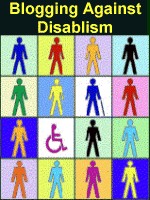Disability’s biggest challenge
“I don’t know how you do it. I could not handle it and would rather die [than be in your situation]”.
This is what a lady told me recently while I was holding a booth at a conference. She did not mean staffing a booth, either. She meant life as a person with a disability. She is, like 52% of Americans, one of the many people who would rather be dead than disabled. These people have no idea how much it hurts to hear comments like that. I know I’m not the only one to experience these things. Jacki Brown, an Australian disability-rights activist just published an account of having to defend her right to live while at a dinner party.
I hear similar comments often enough, phrased in various ways. Depending on the individual in front of me, I try to discuss it further with them. I attempt to make them think further about what they are saying. I rarely succeed – these are deeply held beliefs on their part. And as the saying goes: “You can’t logic someone out of an emotional reaction”.
There are two parts to why statements like that hurt:
- Ill placed sense of admiration
- Complete devaluation of my life.
Ill placed admiration
The subtext of these conversation is often one of admiration. They don’t understand my life, they don’t understand me, and they have no desire to even try to! They imagine that life as a wheelchair user, as someone with a disability, must be so difficult and full of misery, that, for them, the mere fact that I was able to get up, get smartly dressed, and staff a booth is something to be admired. I don’t often get the “you’re an inspiration” statements in these circumstances, but it lays there, unsaid, just below the surface. If you want to admire me, admire me for something admirable I do, not because, nor despite, my disability.
Devaluing my life
I suspect most people who tell me “I don’t know how you do it, I couldn’t live like that” don’t see that what they are effectively saying is “your life is not worth living”. They don’t know anything about me, about my life successes, about my quality of life. They see the wheelchair and they shudder and think “nah ah, not me, couldn’t do it”. They often have very little first or even second hand experience dealing with a disability. They have a fear reaction based on lack of information.
Some, when confronted, are quick to point out it’s nothing to do with me. It’s just that they, themselves, couldn’t handle it – they say. But you can’t conveniently remove us out of that equation. We’re the trigger on these reaction.
When enough people in our society see someone with a disability and think “her life is not worth living”, we end up with a society that believes legalising euthanasia is a good thing. But that’s another story, for another post altogether.
 ](http://tinyurl.com/BADD2015)
](http://tinyurl.com/BADD2015)
Today is Blogging Against Disablism Day 2015. Disablism, also sometimes known as ableism, and can be defined as a form of “social prejudice against people with disabilities”. The discussion is hashtaged on Twitter as #badd2015.
Survival of the fittest
At that same conference, someone explained that it’s normal that people have reactions like these. That it’s a question of survival of the fittest, something we’ve been doing ever since we started as a species. I was hoping that, as a society, we’d be past that. My hope was crushed when talking to another woman who related proudly how she accompanied her mother to the Dignitas clinic in Switzerland so she could get assisted suicide. She also said “society has to survive”, implying that so-called “weaker elements” of society are an impediment to society’s healthy survival.
Are we really still at that point? Have we not evolved at all from the caveman mentality? Can we really ignore the real and significant import of people with disabilities? People like Stephen Hawking, F.D. Roosevelt, Itzhak Perlman, Einstein, Edison, and so many other people with disabilities who are adding real value to our society.
Biggest challenge
Educating people to change that attitude towards disabilities is perhaps the biggest challenge people with disabilities face. Once that’s done, I suspect that everything else will flow. We’re not going to have issues with accessing the workplace. Public transport will become accessible. We’re not going to be locked up in institutions instead of given the opportunities to live in, and be part of, our communities. We’re not going to face poor educational prospects where we have to drop out, or where we’re passed up to the next year simply because a teacher doesn’t want to deal with you anymore. We’re not going to be screened before birth to ensure we’re never born.